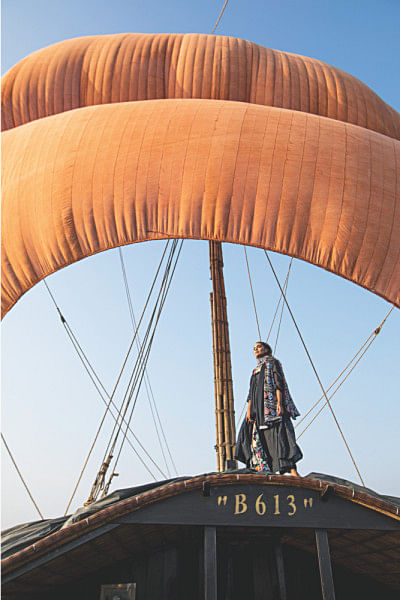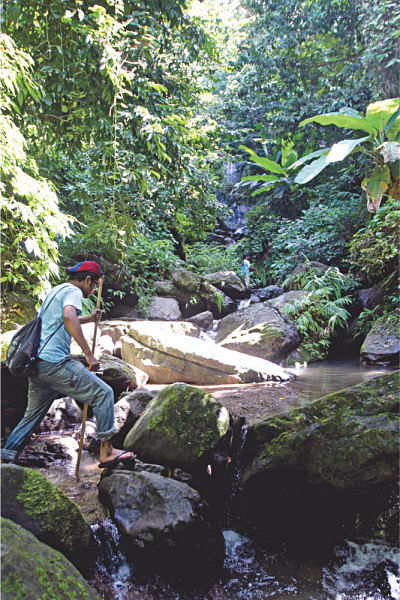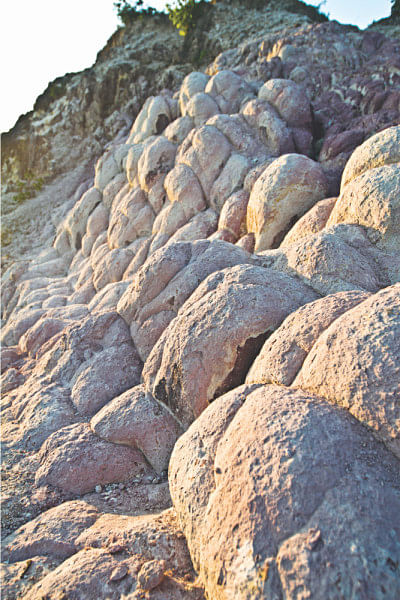Adventure Travel in Bangladesh

The mostly untapped resources for adventure travel here lie in the unspoiled bits of nature in the flatlands, the huge meandering waterways, the verdant hills in the southeast, the various remote villages all over the country, and the numerous varying ecosystems, the char regions. Even many of the so-thought mundane things for many of us, like fishing in the river, staying in a mud/bamboo house and experiencing the simple village life, can actually be quite adventurous to city dwellers uninitiated to rural life.
The pre-requisite for adventure travel, first and foremost, is the potential for thrill — the adrenaline rush that can become quite addictive. The first view that takes your breath away after trekking to the top of a mountain, snorkelling under water to see colourful marine life, whooshing down zip lines over deep valleys, jumping off a hillside to glide down with a parachute, etc. all have that one element in common — excitement. But there are other factors that come into play as well.
Adventure travel is typically suitable for the young and fit, as the inherent activities require a certain level of physical exertion, which many us do not possess at a more advanced age. And as Bangladesh has a large young cohort, with many being aficionados of the unexplored, it is a sector primed for the tapping.

The travails of travel also encourage a more physically active and healthier lifestyle to truly enjoy the experience. Yet, there is no reason to stereotype the adventure traveller, as there are many versions of adventure!
Adventure tourism was simply defined as "an outdoor leisure activity that takes place in an unusual, exotic, remote, or wilderness destination, involves some form of unconventional means of transportation, and tends to be associated with low or high levels of activity," by the Canadian Tourism Commission in 1995. And according to the Adventure Travel Trade Association, a global trade network of more than 1000 businesses, destinations and media, "adventure tourism is a tourist activity that includes physical activity, cultural exchange, or activities in nature."
Combining these, the essence of adventure tourism becomes quite easy to comprehend. Activities like hiking, trekking, caving, safari, homestays, cultural exchange programmes, paragliding etc. are just some options, among many, for the adventure junkie.
Adventure tourism can be of two kinds, hard or soft, with the primary distinction being the level of associated risk, skills, and preparation. For soft adventure, which is the easier of the two, and thus, the more realistic option for most people, includes activities like backpacking, safari, camping, birdwatching, eco-tourism, hiking, rafting, scuba, etc. for which, the help of guides and some minimal training suffices, and thus, has a lower level of risk and skill involved on the part of the traveller.
Hard adventures, on the other hand, often demand strenuous training and come with a heavy dose of adrenaline, with the extra risk! For example, mountaineering, swimming the various ocean channels, rock climbing, etc.

Infrastructure
For any kind of tourism to flourish, both local and international, some basic amenities have to be provided. Infrastructure like roads, information sources, trained guides and other related personnel, and intelligent development with respect to the naturally existing ecosystem and environment are expensive, and require funds, for sure. Funds which Bangladesh has to carefully allocate for the best possible utility derivation. Yet, with careful and long-term planning, it is quite possible to build up a strong and sustainable travel and adventure ecosystem.
However, so far, there seems to be no real thought behind the development of the infrastructure beyond the basic, and often banal. The very real problem of convoluted bureaucratic red tape that impedes many good or innovative initiatives, also hampers the adventure tourism sector.
There are many different bodies in Bangladesh with the mandate to oversee different sides of tourism, which is why it becomes extremely difficult for any streamlining of the processes and permissions, which are already too numerous and often seem beyond logic.
Many of the adventure activities are also considered part of 'sports', and that further complicates things, as The Bangladesh Athletic Federation is not open to or mandated to work with non-professional athletes, or control a lot of sporting activities uncommon in Bangladesh.
This further complicates things, as there is no other authority designated to deal with such issues, and this one is ill-equipped in more ways than just regulations. This makes it difficult for many good ideas to flourish, choking them even before take-off.
"In neighbouring India, with many social and bureaucratic issues similar to us, about a 100 marathon runs are organised a year, while there is not a single annual event like that in Bangladesh," said Muhammad Abdullah, a veteran adventure traveller dabbling in fitness and sports as well one of the founder members of Travellers of Bangladesh (ToB).
ToB is one of the pioneering groups of people advocating and working on adventure tourism with over a million current members, including active travellers and travel enthusiasts.
Abdullah recently organised the first-ever 100-mile marathon in Bangladesh on 17-18 January, 2020. But for the idea to materialise into reality, it was a long, convoluted, and arduous journey from various officials to officials, and department to ministry etc.
From the germination of his intention to hold such an event in Bangladesh, the sheer number of visits that he needed to make to the coastal town — a mind boggling 21— just to secure relevant permits and for a 100 km run along the Marine Drive from Inani point onwards, is a good indication of the system's pace and flaws.
This does not even consider the numerous volunteers' visits and all the effort that went into the actual event. The post-event paperwork was another issue entirely.
Abdullah said that apart from some support from the Parjatan Corporation, which allowed the free use of its premises each time the volunteers went to prep for the marathon event, none of the government organisations helped financially, and official support took a really long time to rally.
Many individuals extended their help on a personal basis, for which Abdullah expressed appreciation, but the need for such actions only underscores how terribly unprepared and cumbersome the systems in place are for the growth of the sector.
"It is often observed that many government bodies are themselves among the worst offenders against the environment. For example, may permanent structures in the more critical areas, like that of the coral island of St. Martin's, are government-organisation controlled. In the case of St. Martin's, the island's coral base is already suffering, with large patches of coral dying or already dead, due to the unsustainable nature of tourism," Mohammad elaborated.
His opinions were echoed by Tanvir Mreedul, another traveller and an early pioneer of adventure travelling with ToB.
Mreedul also said that the lack of systematic development of guides' capacities is quite alarming, especially since there is practically none available. The basic corruption of the system starts with unprepared tourists, making unfair and unreasonable demands of the local/indigenous tribes –like carrying their bags, and sometimes even people-- corrupting the inherent structure, and thus distorting prices and the culture.
On sustainable development, Mohammad pointed out that the citizen's charter of the main beach town is alarmingly wanting, without any real directives about tourism, except outlining how guides and beach-photographers are to be registered!
continued to page 37
From Page 36
"There is nothing on their training, or any other relevant service or issue. This only further points to the lack of depth and thorough unpreparedness to truly nourish sustainable and adventure tourism locally," Mohammad said.
Rivers and water related adventure tourism should be a big sector of development for Bangladesh, yet the very first issue for anyone interested in such endeavours would be unravelling the red tape of bureaucracy, as five different water-related government authorities have jurisdiction over the waterbodies all over Bangladesh. Not only that, the law governing water-based motor vehicles is almost more than 70 years old, and terribly unreliable and inadequate to deal with the demands of modern technologies and times.
Moreover, to protect against environment degradation due to unfettered and irresponsible tourism, measures should include raising awareness from the very childhood, as well as making it mandatory for all commercial tour operators to be accountable for their guests. A simple step would be to ban the influx of single use plastic into the vulnerable areas.
Moving on from broad policy issues to the finer points of tourism infrastructure, Mohammad recounted his experience of participating in two running events in Shillong and Karnataka. His experience there only pinpointed the vulnerabilities of the adventure tourism sector in Bangladesh.
The shops and consumers, even in Karnataka's remote Malnad, all used disposable plates made of parts of the areca-nut tree, actively shunning single-use plastic. Interestingly, similar plates are manufactured in Bangladesh, but are not sold locally. Not only that, even with the most minimal of communication due to language barrier, the run there went smoothly in very difficult rain conditions, and accommodations for the participants were very basic, tin houses and low-pan washrooms, but perfectly clean and dry. Also, it is not always about the existing laws, rather people's attitude towards following them.
"Development is only true when all kinds of travellers can access the services," Mohammad added. This, he feels, is yet to happen in Bangladesh.
"The biggest problem to the flourishing of adventure tourism in Bangladesh are the barriers to access, as law enforcers bar free movement in most of the areas where adventure tourism is possible otherwise," Mreedul adds.
This over-emphasis on security concerns, even in times of peace and stability, often feel exaggerated, and are actually deterrents to proper flourishing of the sector, many of the veteran travellers and operators said.
The fact that travellers have to report at multiple points and to numerous law enforcing agencies causes much loss of time, as well as an added mental hassle. Many seasoned travellers also feel that some vested quarters deliberately spread lies and exaggerated versions of security concerns in many of the tourism suited areas, simply to push prices higher and make a neat profit off of people's concerns for safety.
Conclusion
As more and more people take up travelling inside the country, it becomes more and more important to put in place a comprehensive system for the intelligent and sustainable development and monitoring of various aspects of tourism.
Randomly placed buildings, unplanned waste management, unfettered access, are not only detrimental to the environment, but to the indigenous communities, as well as the cultures and way of life for the locals. This, ultimately is a threat to the environment, as well as tourism.
In Bangladesh's case, one very important aspect, even more than the availability of the building of infrastructure and amenities, is the tourists' level of understanding and civic sense during the use of such services, and the reluctance to follow rules and pay due fees. Most adventure enthusiasts believe that this needs to be addressed at the root, right from the schools, so that at least future generations are more responsible.
The dire need for our people to be made aware about the etiquettes of responsible travel and general civility cannot be emphasised enough. More often than not, public sanitation facilities that I have come across in many places in Bangladesh suffered not from lack of funds, but a marked lack of common sense and decency from someone who had used them. Tissues stuffed in the sink, unflushed pans, and generally disgusting symptoms of the completely uncivilised nature of many of the tourists. And just to be clear, "formal education" has very little to do with these issues.
Let us then embark on the adventures offered in Bangladesh aplenty, without ruining the landscape forever.

 For all latest news, follow The Daily Star's Google News channel.
For all latest news, follow The Daily Star's Google News channel. 



Comments